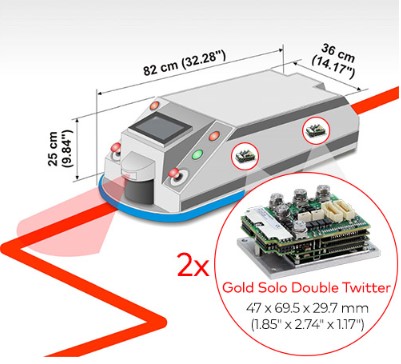
Background
The mobile robot is an innovative, two-wheeled, autonomous vehicle designed for delivery of heavy components. A unique feature is the capability to follow a line along magnetic tape for path guidance. This allows the robot to adjust dynamically to changing surface paths and continue to operate without interference.
The mobile robot uses Elmo's proprietary Solo Guitar intelligence to follow the line and accordingly adapt device behavior. If there is a deviation, Elmo's Solo Guitar compensates by adjusting the steering, which is done without using a multi-axis control module. The mobile robot can be used for a variety of load transfer operations and is especially suited to the automotive, packaging, aerospace and medical sectors.
The mobile robot implements a “master-follower” concept. A master motor outputs (emulates) the encoder of the “following” axis. This allows the “following” motor to use the master motor’s feedback, both as a reference and a target. Additionally, the on-board intelligence monitors the input (I/O). These actions are performed relative to the master axis as the steering method.
The mobile robot incorporates two Solo Guitar servo drives from Elmo’s SimplIQ Line, one for each of the two wheels. The mobile robot’s dimensions require compactness, which allows for strategic implementation onto the available floor space, where economy is always a concern. Its small footprint allows the customer to implement cost effective, reliable automation in a production line, and to better utilize human talent which saves both time and energy.
Application Challenges
TThe manufacturer’s main aims for the mobile robot were:
- To achieve quick time-to-market with the smallest, most cost effective mobile robot on the market that can handle loads of 1 tone (2,000 lbs+).
- To implement competent, cost effective wheel steering technology.
- To obtain the most efficient mobile robot possible, utilising the least amount of battery power for continuous operation over shifts, which allows for less frequent charging
- To utilise a minimal footprint servo drive, designed to be small enough to fit easily into the robot
All components used in the mobile robot must withstand a continuous shift environment and perform reliably with off-the-shelf components for quick time-to-market. The mobile robot was required to be highly reliable with an extended Mean Time Between Failures (MTBF) for all its different motion functions.
As the product incorporated an adaptive line sensing technique, the motion commands have to be delivered and received swiftly and accurately to provide precise motion in challenging and delicate operations (e.g. charge station, block detection, emergency stop etc.)
The compact size of the robot required motion control products that could supply high power density within a small unit. Battery drainage is the prime concern for robust autonomous vehicles in manufacturing environments. Too many oversized components located within the vehicle create inefficiencies resulting in the need to recharge batteries multiple times within a shift. With Elmo’s advanced unipolar switching technology, servo drives can efficiently run motors and not waste current on conventional control.
Moreover, autonomous vehicles have other components in the system that could be eliminated, enabling overall system cost reduction to the manufacturer for a longer lasting investment. This is achieved by reducing between-shift inefficiency and increasing production utilization by running the motors efficiently.
The two Solo Guitars were installed in a specially designed location within the vehicle near to the motors. The connector types and locations were chosen to optimize the robot’s production and minimize maintenance. Elmo’s application engineers worked with the design team on-site in order to ensure successful integration of the products and shorten the time-to-market.
The Solo Guitar drives already include the capability to perform sophisticated motion control loops for precise movement, feedback inputs, programming capabilities and communication support. Elmo's implementation of the standard CANopen communication allows the line following processor to communicate device states to the Elmo input logic. Excellent connectivity reduces time-to-market and eliminates the need for extra components. Elmo’s proprietary Composer software is used to program the commands for the Solo Guitar, and this enables the robot to perform precise tasks that require rapid and accurate movement.
Solo Guitar drives are very reliable and can meet the strenuous demands of 24x7 manufacturing environments.
The Solution
- Product Family: Servo drives
- Product Used: Solo Guitar servo drive from Elmo Motion Control
- Product Type: Standard
The Solo Guitar digital drive was chosen for this application due to its compact size, power range and intelligence. The Solo Guitar is very compact, measuring just 80 x 61 x 46.7mm and weighing only 200 g. It has a peak output of 1.7 kW – 35 A at 24Vdc.
Two SOL-GUI-35/60s were chosen to be installed in the mobile robot. The Solo Guitar is a member of Elmo’s SimplIQ Line, designed especially for applications where compact size, integrated intelligence and high power density efficiency matter the most.
Benefits: Why Elmo Digital Servo Drive?
- Compact drive with a connector mounting interface that allows for an immediate time-to-market
- High power density, efficiency and intelligence within a small package
- High reliability in demanding 24x7 factory automation environments
- Dedicated support engineers to ensure successful implementation of solutions on site
- Fast, precise and smooth motion control without the need for a full multi-axis controller or on-board PLC that drain battery power
- Standard communication protocols